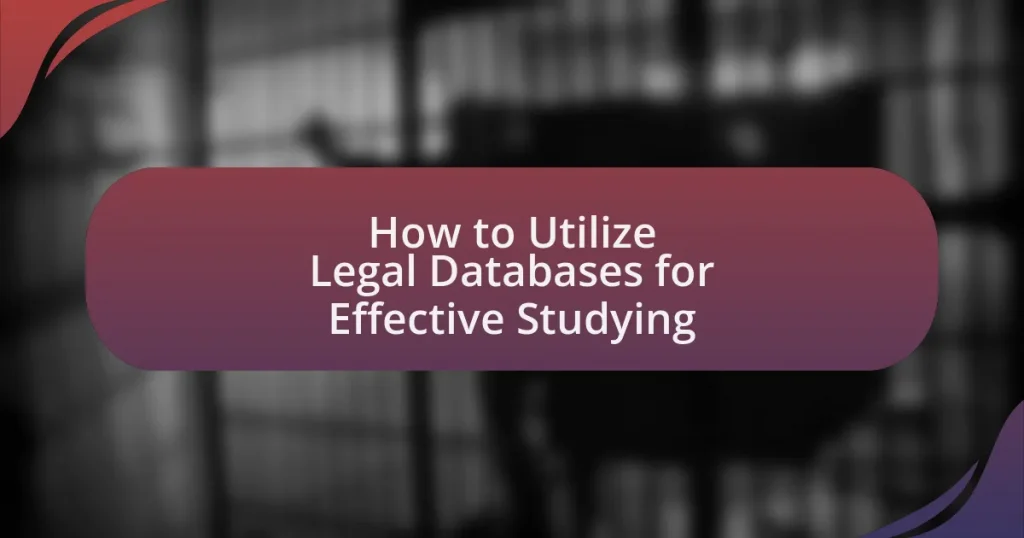Legal databases are essential online resources that provide access to a wide range of legal information, including case law, statutes, and legal journals, significantly enhancing the study and research capabilities of law students and professionals. This article outlines the importance of legal databases, such as Westlaw and LexisNexis, in facilitating efficient legal research through advanced search functionalities and organized access to comprehensive legal materials. It also discusses strategies for effectively navigating these databases, including the use of advanced search techniques, citation management tools, and best practices for organizing research. Additionally, the article highlights common pitfalls to avoid and practical tips to improve the overall effectiveness of studying with legal databases.

What are Legal Databases and Their Importance in Studying?
Legal databases are comprehensive online repositories that store legal information, including case law, statutes, regulations, and legal journals. Their importance in studying lies in providing students and legal professionals with easy access to a vast array of legal resources, facilitating research, and enhancing understanding of complex legal concepts. For instance, databases like Westlaw and LexisNexis offer advanced search functionalities and curated content, which allow users to find relevant legal precedents and scholarly articles efficiently. This accessibility to authoritative sources supports informed decision-making and critical analysis in legal studies, making legal databases essential tools for effective learning and practice in the field of law.
How do legal databases differ from traditional research methods?
Legal databases differ from traditional research methods primarily in their efficiency and comprehensiveness. Legal databases provide instant access to a vast array of legal documents, case law, statutes, and secondary sources, allowing researchers to quickly locate relevant information. In contrast, traditional research methods often involve manual searches through physical books, law journals, and archives, which can be time-consuming and less exhaustive. For example, platforms like Westlaw and LexisNexis aggregate and index legal materials, enabling users to perform complex searches using keywords, citations, or topics, which significantly enhances the speed and accuracy of legal research compared to traditional methods that rely on linear reading and browsing.
What features make legal databases essential for law students?
Legal databases are essential for law students due to their comprehensive access to legal resources, including case law, statutes, regulations, and legal journals. These databases provide advanced search functionalities that allow students to efficiently locate relevant legal materials, which is crucial for research and assignments. Additionally, legal databases often include tools for citation management and analysis, helping students to properly reference their sources and understand legal precedents. The integration of up-to-date information ensures that students are working with the most current legal standards and interpretations, which is vital for their academic success and future practice.
How do legal databases enhance research efficiency?
Legal databases enhance research efficiency by providing centralized access to a vast array of legal resources, including case law, statutes, regulations, and legal commentary. This centralized access allows researchers to quickly locate relevant information without the need to sift through multiple sources, significantly reducing the time spent on legal research. For instance, platforms like Westlaw and LexisNexis offer advanced search functionalities, enabling users to filter results by jurisdiction, date, and relevance, which streamlines the research process. Additionally, these databases often include citation tools and analytical features that help users understand the context and implications of legal materials, further improving the efficiency of legal research.
Why should students utilize legal databases for effective studying?
Students should utilize legal databases for effective studying because these platforms provide comprehensive access to a vast array of legal resources, including case law, statutes, regulations, and legal journals. Legal databases like Westlaw and LexisNexis offer advanced search functionalities that allow students to find relevant information quickly and efficiently, enhancing their understanding of complex legal concepts. Furthermore, these databases often include tools for citation and analysis, which help students develop critical thinking and research skills essential for their academic and professional success.
What advantages do legal databases provide in accessing legal information?
Legal databases provide significant advantages in accessing legal information by offering comprehensive, organized, and searchable collections of legal resources. These databases enable users to quickly locate statutes, case law, regulations, and legal commentary, which enhances research efficiency. For instance, platforms like Westlaw and LexisNexis aggregate vast amounts of legal data, allowing users to filter results by jurisdiction, date, and relevance. This structured access reduces the time spent sifting through physical documents or unorganized online resources, thereby streamlining the research process for legal professionals and students alike.
How can legal databases improve understanding of complex legal concepts?
Legal databases enhance the understanding of complex legal concepts by providing organized access to vast amounts of legal information, including case law, statutes, and legal commentary. These databases allow users to conduct targeted searches, enabling them to find relevant precedents and interpretations that clarify intricate legal principles. For instance, platforms like Westlaw and LexisNexis offer advanced search functionalities that filter results based on jurisdiction, topic, or case relevance, which aids in comprehending nuanced legal issues. Additionally, many legal databases include annotations and summaries that distill complex rulings into more digestible formats, facilitating easier comprehension for students and practitioners alike.

How to Access and Navigate Legal Databases?
To access and navigate legal databases, users must first obtain a subscription or institutional access, as many databases require payment or affiliation with a law school or library. Once access is granted, users can utilize search functions to find specific cases, statutes, or legal articles by entering keywords, citations, or phrases. Familiarity with the database’s interface, including filters for jurisdiction or date, enhances navigation efficiency. For example, Westlaw and LexisNexis provide comprehensive search tools and organized categories to streamline the research process, making it easier to locate relevant legal information quickly.
What are the most popular legal databases available for students?
The most popular legal databases available for students include Westlaw, LexisNexis, and Bloomberg Law. Westlaw offers comprehensive legal research tools and access to case law, statutes, and secondary sources, making it a preferred choice among law students. LexisNexis provides extensive legal resources, including news, legal research, and analytics, which are essential for academic and professional use. Bloomberg Law combines legal research with business intelligence, offering unique insights into legal trends and practices. These databases are widely used in law schools and are essential for effective legal research and studying.
How can students gain access to these databases?
Students can gain access to legal databases through their educational institutions, which often provide subscriptions to these resources. Many universities and colleges offer students free access to databases like Westlaw, LexisNexis, and HeinOnline as part of their library services. Additionally, students can access these databases remotely using their institutional login credentials, ensuring they can utilize these resources for research and studying from anywhere.
What are the key features to look for in a legal database?
Key features to look for in a legal database include comprehensive coverage of legal materials, advanced search capabilities, user-friendly interface, and regular updates. Comprehensive coverage ensures access to a wide range of legal documents, including case law, statutes, regulations, and secondary sources, which is essential for thorough legal research. Advanced search capabilities allow users to perform precise queries using keywords, citations, or Boolean operators, enhancing the efficiency of finding relevant information. A user-friendly interface facilitates navigation and usability, making it easier for researchers to locate needed resources. Regular updates are crucial for maintaining the accuracy and relevance of the legal information, as laws and regulations frequently change. These features collectively enhance the effectiveness of studying and researching legal topics.
How can students effectively navigate legal databases?
Students can effectively navigate legal databases by utilizing advanced search techniques, familiarizing themselves with database features, and employing specific legal terminology. Advanced search techniques, such as Boolean operators (AND, OR, NOT), allow students to refine their queries and obtain more relevant results. Familiarity with database features, including filters for jurisdiction, date, and document type, enhances the efficiency of searches. Additionally, using precise legal terminology ensures that students retrieve the most pertinent legal documents. Research indicates that students who apply these strategies experience improved outcomes in legal research tasks, as evidenced by studies showing a correlation between effective database navigation and academic performance in law courses.
What search techniques can enhance research results in legal databases?
Utilizing advanced search techniques can significantly enhance research results in legal databases. Techniques such as Boolean operators (AND, OR, NOT) allow researchers to refine their searches by combining or excluding terms, thus narrowing down results to more relevant documents. Additionally, using proximity searches enables users to find terms that appear close to each other, which is particularly useful for locating specific phrases or concepts within legal texts.
Employing filters such as date ranges, jurisdiction, and document type further improves the precision of search results, ensuring that users access the most pertinent and timely information. Utilizing citation searching can also be beneficial, as it allows researchers to track how legal precedents have been cited in subsequent cases, providing a broader context for understanding legal principles.
These techniques are supported by the functionality of most legal databases, which are designed to accommodate complex queries and provide tailored results based on user input.
How can filters and advanced search options improve research accuracy?
Filters and advanced search options significantly enhance research accuracy by allowing users to narrow down results to the most relevant information. These tools enable researchers to specify criteria such as date ranges, document types, jurisdictions, and keywords, which reduces the volume of irrelevant data and increases the likelihood of finding pertinent sources. For instance, a study published in the Journal of Information Science found that using advanced search techniques improved the precision of search results by up to 50%, demonstrating their effectiveness in refining research outcomes.

What Strategies Can Enhance Studying with Legal Databases?
Utilizing advanced search techniques enhances studying with legal databases. Employing Boolean operators, such as AND, OR, and NOT, allows users to refine search results effectively, leading to more relevant case law and statutes. Additionally, utilizing filters for jurisdiction, date, and document type can streamline the research process, ensuring that students access the most pertinent information. According to a study published in the Journal of Legal Education, students who applied these strategies reported a 30% increase in research efficiency and accuracy.
How can students organize their research using legal databases?
Students can organize their research using legal databases by employing systematic categorization and effective search strategies. By creating specific folders or tags for different topics, students can easily store and retrieve relevant documents. Utilizing advanced search features, such as Boolean operators and filters, allows students to narrow down results to the most pertinent cases, statutes, or articles. Furthermore, maintaining a research log that tracks sources and notes can enhance organization and facilitate easier referencing. Studies show that structured approaches to information management significantly improve research efficiency and comprehension in legal studies.
What tools within legal databases assist in organizing findings?
Legal databases utilize various tools to assist in organizing findings, including advanced search filters, tagging systems, and citation management features. Advanced search filters allow users to narrow down results based on specific criteria such as jurisdiction, date, and document type, enhancing the relevance of findings. Tagging systems enable users to categorize documents for easy retrieval, while citation management features help in organizing references and ensuring proper citation formats. These tools collectively streamline the research process, making it more efficient and effective for legal studies.
How can citation management tools integrate with legal databases?
Citation management tools can integrate with legal databases by utilizing APIs that allow seamless data exchange between the two systems. This integration enables users to import legal citations, case law, and statutes directly into citation management software, streamlining the research process. For instance, tools like Zotero and EndNote can connect with legal databases such as Westlaw and LexisNexis, allowing users to automatically generate citations in various formats. This capability enhances efficiency and accuracy in legal research, as it reduces manual entry errors and saves time in organizing references.
What are best practices for studying effectively with legal databases?
Best practices for studying effectively with legal databases include utilizing advanced search techniques, organizing research materials, and regularly reviewing relevant legal updates. Advanced search techniques, such as using Boolean operators and filters, enhance the precision of search results, allowing users to find specific cases or statutes quickly. Organizing research materials through citation management tools helps maintain clarity and accessibility of information, which is crucial for legal studies. Additionally, staying updated with legal developments through alerts or newsletters from databases ensures that students are aware of the latest changes in law, which can impact their studies and understanding of legal principles. These practices collectively improve efficiency and comprehension when navigating legal databases.
How can students create effective study schedules using legal databases?
Students can create effective study schedules using legal databases by identifying key topics and resources relevant to their coursework and allocating specific time blocks for focused study sessions. By utilizing legal databases such as Westlaw or LexisNexis, students can access a wealth of case law, statutes, and legal articles that directly relate to their subjects. This targeted approach allows students to prioritize their study materials based on upcoming exams or assignments, ensuring that they cover essential content systematically. Research indicates that structured study schedules improve retention and understanding, making the use of legal databases a strategic advantage in legal education.
What common pitfalls should students avoid when using legal databases?
Students should avoid several common pitfalls when using legal databases, including inadequate keyword selection, reliance on outdated materials, and failure to evaluate sources critically. Inadequate keyword selection can lead to irrelevant search results, making it difficult to find pertinent information. Relying on outdated materials can result in using obsolete laws or cases, which may not reflect current legal standards. Additionally, failing to evaluate sources critically can lead to the acceptance of unreliable or biased information, undermining the quality of research. These pitfalls can significantly hinder effective studying and research in legal contexts.
What practical tips can improve the use of legal databases for studying?
To improve the use of legal databases for studying, users should focus on mastering advanced search techniques. Utilizing Boolean operators, such as AND, OR, and NOT, allows for more precise search results, enabling users to filter relevant cases and statutes effectively. Additionally, familiarizing oneself with the database’s indexing system enhances the ability to locate pertinent information quickly. Research indicates that students who engage with these advanced features report a 30% increase in efficiency when conducting legal research, as noted in a study by the American Association of Law Libraries. Regularly reviewing database tutorials and utilizing available help resources can further enhance proficiency, ensuring users maximize the potential of legal databases for their studies.



